Nursing Clinical Placement: A Reflective Essay on Skill Development
VerifiedAdded on 2023/06/15
|6
|1731
|370
Essay
AI Summary
This essay is a reflective account of a nursing student's 120-hour clinical placement, utilizing Gibb's cycle to analyze the experience. The reflection covers various aspects, including skill development, teamwork, and ethical practice. The student identifies both positive and negative feelings associated with the placement, acknowledging areas of deficit such as anxiety, discomfort with certain patient care tasks, and a medication error. The essay details the student's evaluation of these experiences, the analysis of the root causes, and a comprehensive action plan for improvement, including increased engagement in CPD activities, mentorship, and a deeper understanding of the scope of practice. The conclusion emphasizes the value of the clinical placement in enhancing critical thinking, self-confidence, and professional development, with a commitment to continuous learning and ethical practice.
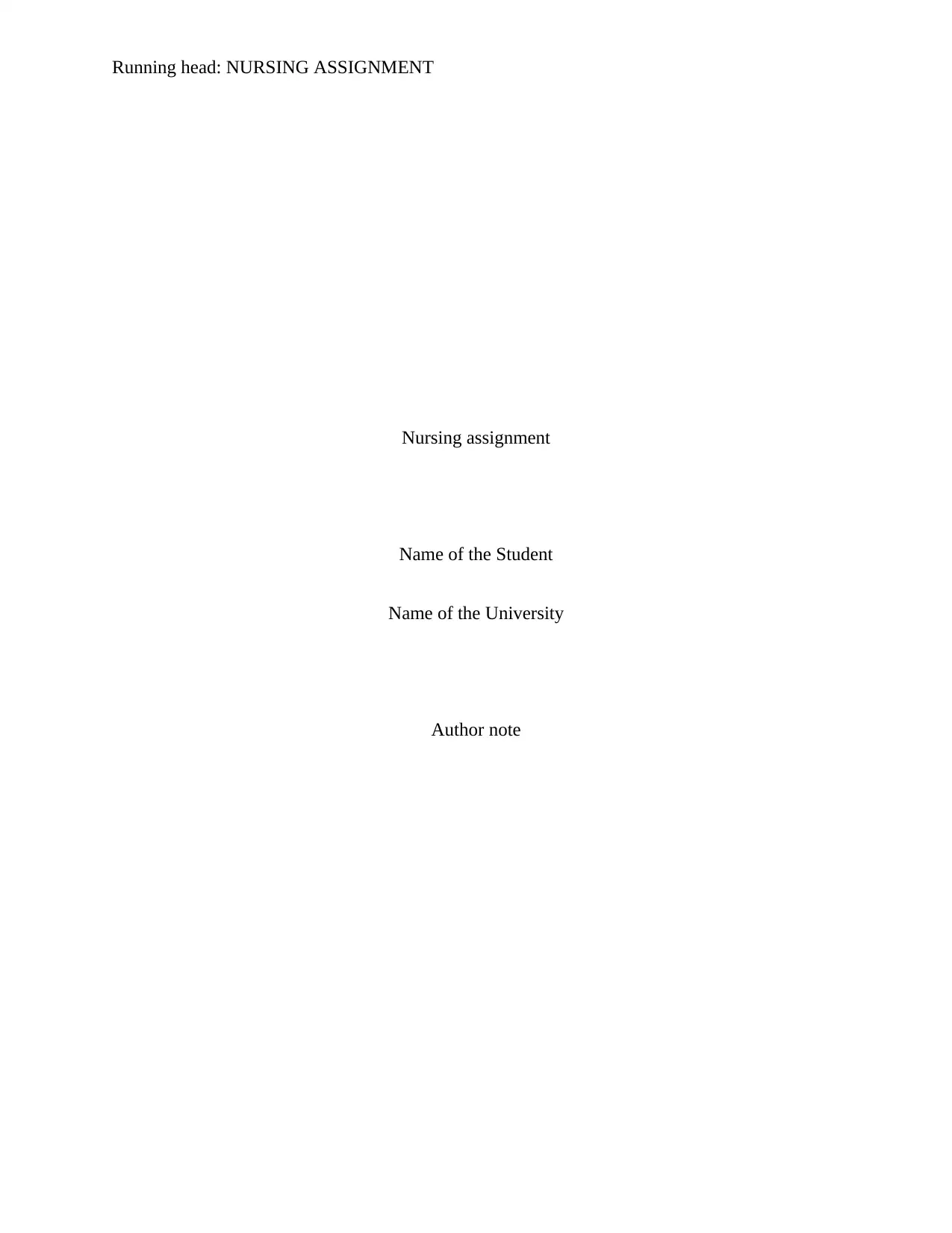
Running head: NURSING ASSIGNMENT
Nursing assignment
Name of the Student
Name of the University
Author note
Nursing assignment
Name of the Student
Name of the University
Author note
Paraphrase This Document
Need a fresh take? Get an instant paraphrase of this document with our AI Paraphraser
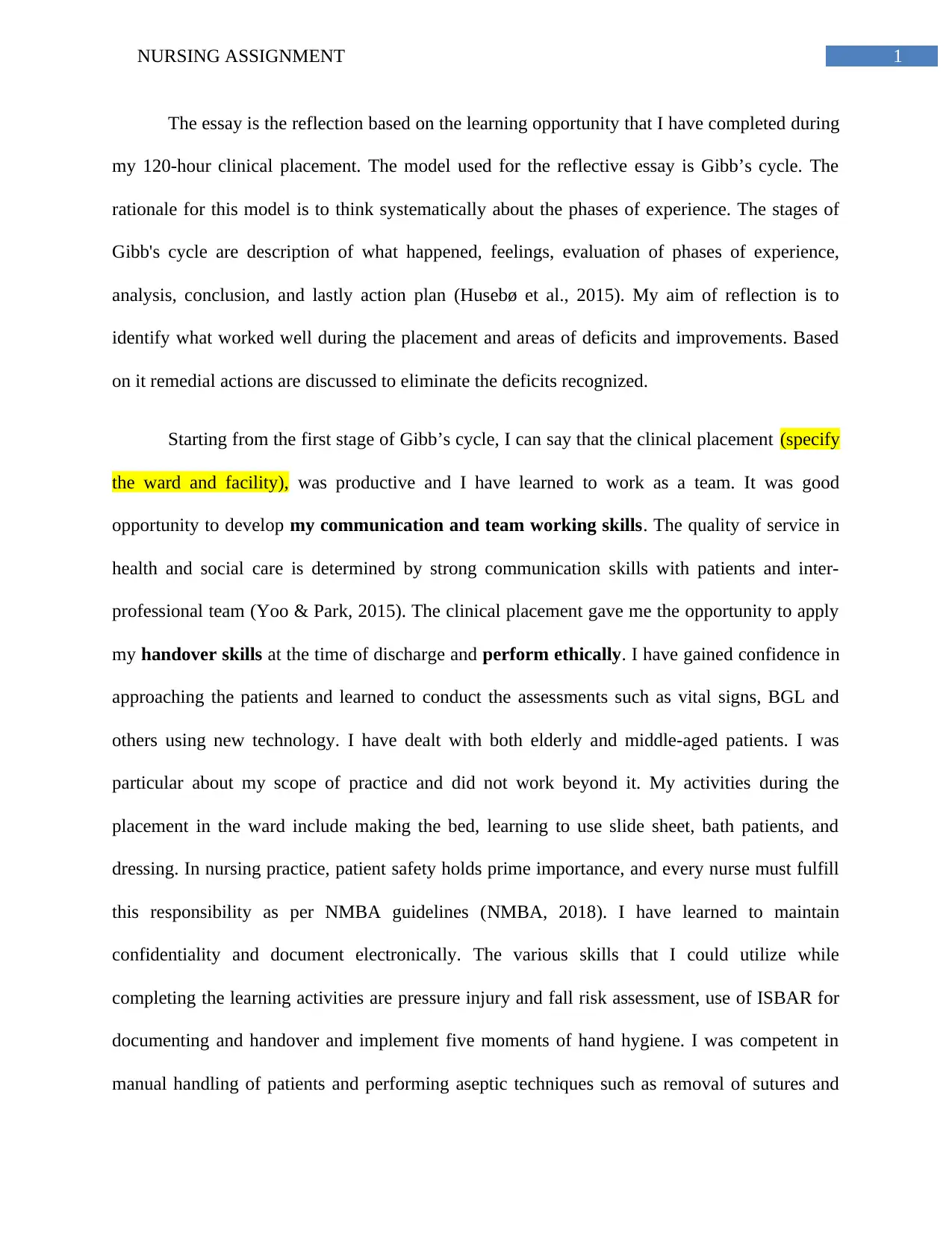
1NURSING ASSIGNMENT
The essay is the reflection based on the learning opportunity that I have completed during
my 120-hour clinical placement. The model used for the reflective essay is Gibb’s cycle. The
rationale for this model is to think systematically about the phases of experience. The stages of
Gibb's cycle are description of what happened, feelings, evaluation of phases of experience,
analysis, conclusion, and lastly action plan (Husebø et al., 2015). My aim of reflection is to
identify what worked well during the placement and areas of deficits and improvements. Based
on it remedial actions are discussed to eliminate the deficits recognized.
Starting from the first stage of Gibb’s cycle, I can say that the clinical placement (specify
the ward and facility), was productive and I have learned to work as a team. It was good
opportunity to develop my communication and team working skills. The quality of service in
health and social care is determined by strong communication skills with patients and inter-
professional team (Yoo & Park, 2015). The clinical placement gave me the opportunity to apply
my handover skills at the time of discharge and perform ethically. I have gained confidence in
approaching the patients and learned to conduct the assessments such as vital signs, BGL and
others using new technology. I have dealt with both elderly and middle-aged patients. I was
particular about my scope of practice and did not work beyond it. My activities during the
placement in the ward include making the bed, learning to use slide sheet, bath patients, and
dressing. In nursing practice, patient safety holds prime importance, and every nurse must fulfill
this responsibility as per NMBA guidelines (NMBA, 2018). I have learned to maintain
confidentiality and document electronically. The various skills that I could utilize while
completing the learning activities are pressure injury and fall risk assessment, use of ISBAR for
documenting and handover and implement five moments of hand hygiene. I was competent in
manual handling of patients and performing aseptic techniques such as removal of sutures and
The essay is the reflection based on the learning opportunity that I have completed during
my 120-hour clinical placement. The model used for the reflective essay is Gibb’s cycle. The
rationale for this model is to think systematically about the phases of experience. The stages of
Gibb's cycle are description of what happened, feelings, evaluation of phases of experience,
analysis, conclusion, and lastly action plan (Husebø et al., 2015). My aim of reflection is to
identify what worked well during the placement and areas of deficits and improvements. Based
on it remedial actions are discussed to eliminate the deficits recognized.
Starting from the first stage of Gibb’s cycle, I can say that the clinical placement (specify
the ward and facility), was productive and I have learned to work as a team. It was good
opportunity to develop my communication and team working skills. The quality of service in
health and social care is determined by strong communication skills with patients and inter-
professional team (Yoo & Park, 2015). The clinical placement gave me the opportunity to apply
my handover skills at the time of discharge and perform ethically. I have gained confidence in
approaching the patients and learned to conduct the assessments such as vital signs, BGL and
others using new technology. I have dealt with both elderly and middle-aged patients. I was
particular about my scope of practice and did not work beyond it. My activities during the
placement in the ward include making the bed, learning to use slide sheet, bath patients, and
dressing. In nursing practice, patient safety holds prime importance, and every nurse must fulfill
this responsibility as per NMBA guidelines (NMBA, 2018). I have learned to maintain
confidentiality and document electronically. The various skills that I could utilize while
completing the learning activities are pressure injury and fall risk assessment, use of ISBAR for
documenting and handover and implement five moments of hand hygiene. I was competent in
manual handling of patients and performing aseptic techniques such as removal of sutures and
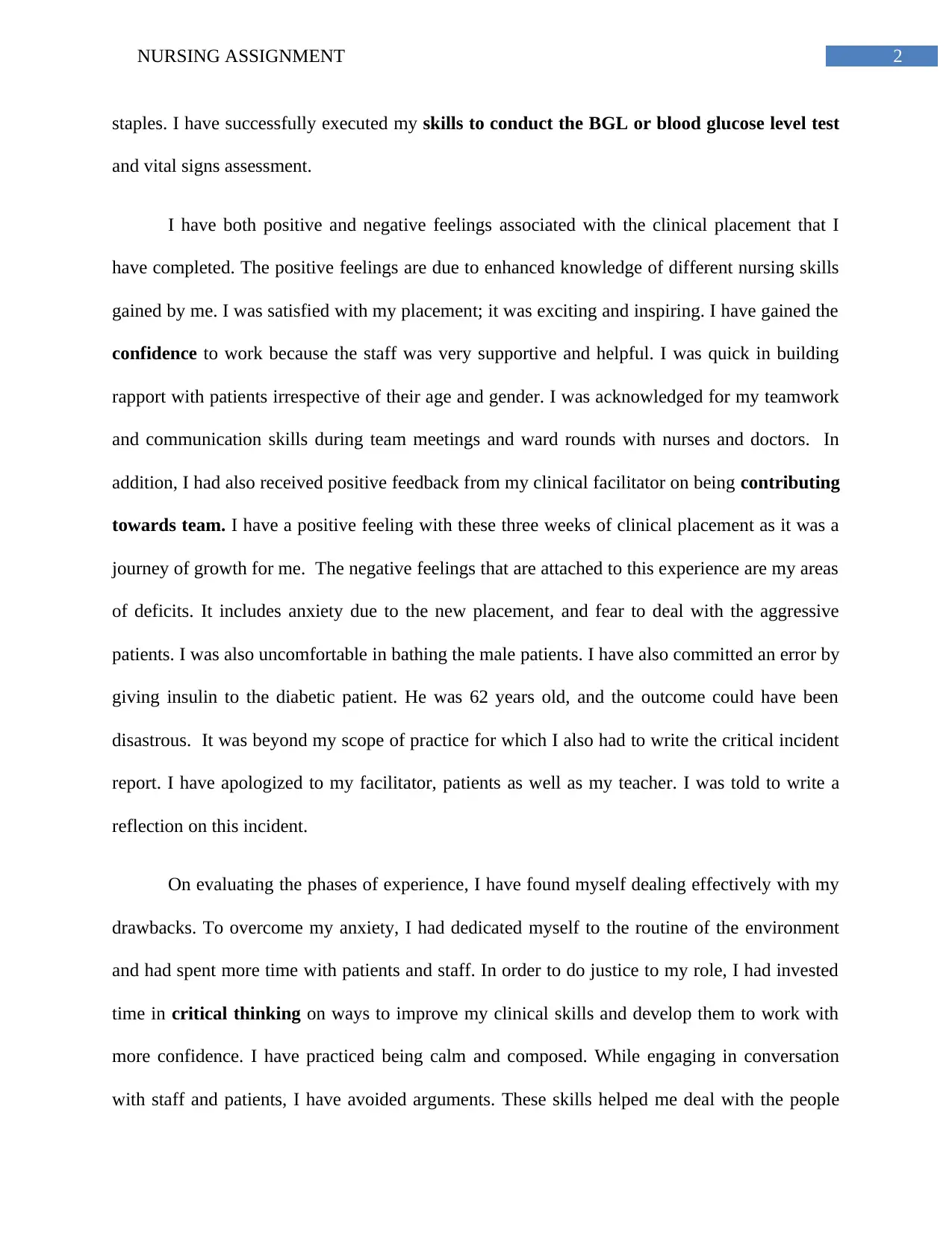
2NURSING ASSIGNMENT
staples. I have successfully executed my skills to conduct the BGL or blood glucose level test
and vital signs assessment.
I have both positive and negative feelings associated with the clinical placement that I
have completed. The positive feelings are due to enhanced knowledge of different nursing skills
gained by me. I was satisfied with my placement; it was exciting and inspiring. I have gained the
confidence to work because the staff was very supportive and helpful. I was quick in building
rapport with patients irrespective of their age and gender. I was acknowledged for my teamwork
and communication skills during team meetings and ward rounds with nurses and doctors. In
addition, I had also received positive feedback from my clinical facilitator on being contributing
towards team. I have a positive feeling with these three weeks of clinical placement as it was a
journey of growth for me. The negative feelings that are attached to this experience are my areas
of deficits. It includes anxiety due to the new placement, and fear to deal with the aggressive
patients. I was also uncomfortable in bathing the male patients. I have also committed an error by
giving insulin to the diabetic patient. He was 62 years old, and the outcome could have been
disastrous. It was beyond my scope of practice for which I also had to write the critical incident
report. I have apologized to my facilitator, patients as well as my teacher. I was told to write a
reflection on this incident.
On evaluating the phases of experience, I have found myself dealing effectively with my
drawbacks. To overcome my anxiety, I had dedicated myself to the routine of the environment
and had spent more time with patients and staff. In order to do justice to my role, I had invested
time in critical thinking on ways to improve my clinical skills and develop them to work with
more confidence. I have practiced being calm and composed. While engaging in conversation
with staff and patients, I have avoided arguments. These skills helped me deal with the people
staples. I have successfully executed my skills to conduct the BGL or blood glucose level test
and vital signs assessment.
I have both positive and negative feelings associated with the clinical placement that I
have completed. The positive feelings are due to enhanced knowledge of different nursing skills
gained by me. I was satisfied with my placement; it was exciting and inspiring. I have gained the
confidence to work because the staff was very supportive and helpful. I was quick in building
rapport with patients irrespective of their age and gender. I was acknowledged for my teamwork
and communication skills during team meetings and ward rounds with nurses and doctors. In
addition, I had also received positive feedback from my clinical facilitator on being contributing
towards team. I have a positive feeling with these three weeks of clinical placement as it was a
journey of growth for me. The negative feelings that are attached to this experience are my areas
of deficits. It includes anxiety due to the new placement, and fear to deal with the aggressive
patients. I was also uncomfortable in bathing the male patients. I have also committed an error by
giving insulin to the diabetic patient. He was 62 years old, and the outcome could have been
disastrous. It was beyond my scope of practice for which I also had to write the critical incident
report. I have apologized to my facilitator, patients as well as my teacher. I was told to write a
reflection on this incident.
On evaluating the phases of experience, I have found myself dealing effectively with my
drawbacks. To overcome my anxiety, I had dedicated myself to the routine of the environment
and had spent more time with patients and staff. In order to do justice to my role, I had invested
time in critical thinking on ways to improve my clinical skills and develop them to work with
more confidence. I have practiced being calm and composed. While engaging in conversation
with staff and patients, I have avoided arguments. These skills helped me deal with the people
⊘ This is a preview!⊘
Do you want full access?
Subscribe today to unlock all pages.

Trusted by 1+ million students worldwide
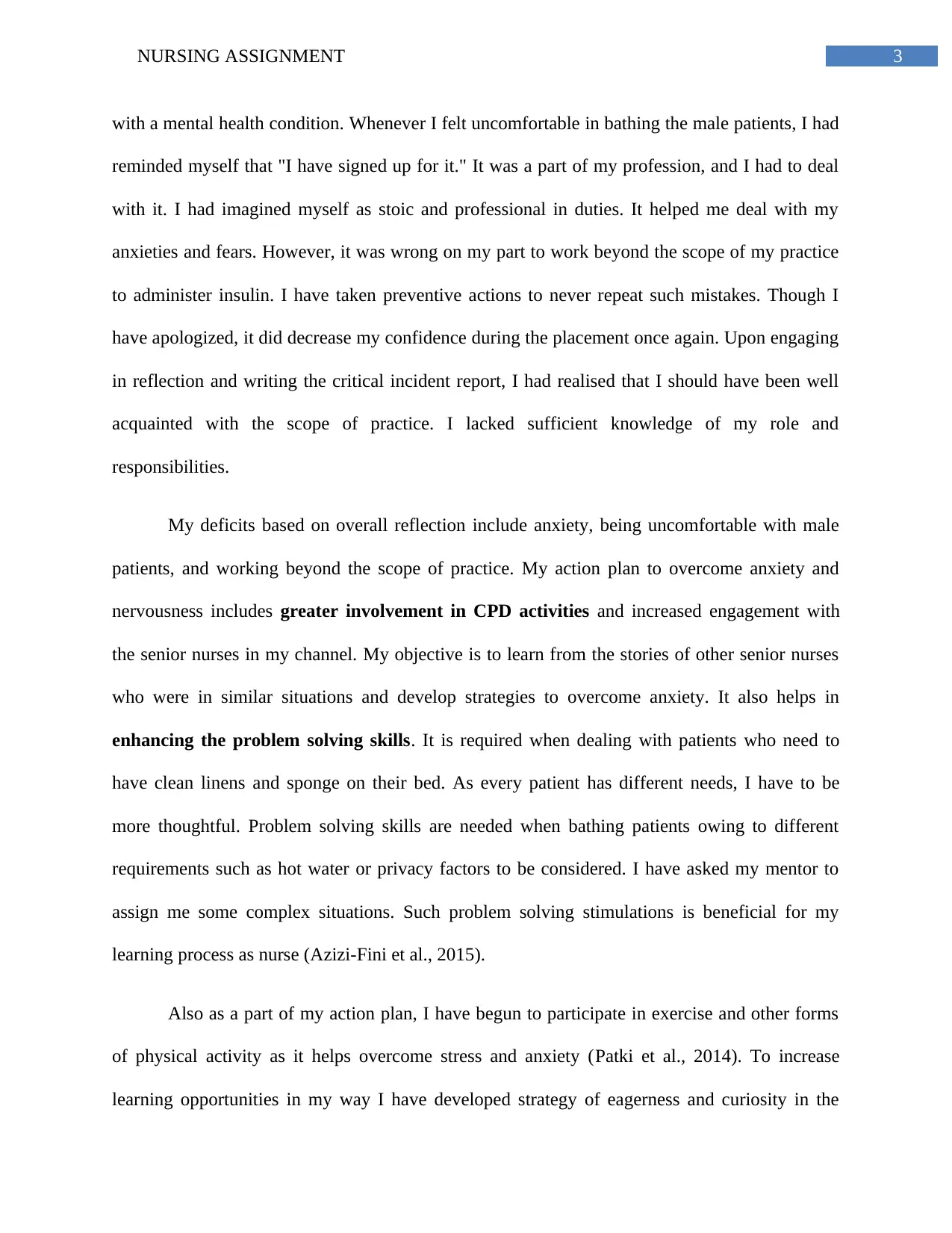
3NURSING ASSIGNMENT
with a mental health condition. Whenever I felt uncomfortable in bathing the male patients, I had
reminded myself that "I have signed up for it." It was a part of my profession, and I had to deal
with it. I had imagined myself as stoic and professional in duties. It helped me deal with my
anxieties and fears. However, it was wrong on my part to work beyond the scope of my practice
to administer insulin. I have taken preventive actions to never repeat such mistakes. Though I
have apologized, it did decrease my confidence during the placement once again. Upon engaging
in reflection and writing the critical incident report, I had realised that I should have been well
acquainted with the scope of practice. I lacked sufficient knowledge of my role and
responsibilities.
My deficits based on overall reflection include anxiety, being uncomfortable with male
patients, and working beyond the scope of practice. My action plan to overcome anxiety and
nervousness includes greater involvement in CPD activities and increased engagement with
the senior nurses in my channel. My objective is to learn from the stories of other senior nurses
who were in similar situations and develop strategies to overcome anxiety. It also helps in
enhancing the problem solving skills. It is required when dealing with patients who need to
have clean linens and sponge on their bed. As every patient has different needs, I have to be
more thoughtful. Problem solving skills are needed when bathing patients owing to different
requirements such as hot water or privacy factors to be considered. I have asked my mentor to
assign me some complex situations. Such problem solving stimulations is beneficial for my
learning process as nurse (Azizi-Fini et al., 2015).
Also as a part of my action plan, I have begun to participate in exercise and other forms
of physical activity as it helps overcome stress and anxiety (Patki et al., 2014). To increase
learning opportunities in my way I have developed strategy of eagerness and curiosity in the
with a mental health condition. Whenever I felt uncomfortable in bathing the male patients, I had
reminded myself that "I have signed up for it." It was a part of my profession, and I had to deal
with it. I had imagined myself as stoic and professional in duties. It helped me deal with my
anxieties and fears. However, it was wrong on my part to work beyond the scope of my practice
to administer insulin. I have taken preventive actions to never repeat such mistakes. Though I
have apologized, it did decrease my confidence during the placement once again. Upon engaging
in reflection and writing the critical incident report, I had realised that I should have been well
acquainted with the scope of practice. I lacked sufficient knowledge of my role and
responsibilities.
My deficits based on overall reflection include anxiety, being uncomfortable with male
patients, and working beyond the scope of practice. My action plan to overcome anxiety and
nervousness includes greater involvement in CPD activities and increased engagement with
the senior nurses in my channel. My objective is to learn from the stories of other senior nurses
who were in similar situations and develop strategies to overcome anxiety. It also helps in
enhancing the problem solving skills. It is required when dealing with patients who need to
have clean linens and sponge on their bed. As every patient has different needs, I have to be
more thoughtful. Problem solving skills are needed when bathing patients owing to different
requirements such as hot water or privacy factors to be considered. I have asked my mentor to
assign me some complex situations. Such problem solving stimulations is beneficial for my
learning process as nurse (Azizi-Fini et al., 2015).
Also as a part of my action plan, I have begun to participate in exercise and other forms
of physical activity as it helps overcome stress and anxiety (Patki et al., 2014). To increase
learning opportunities in my way I have developed strategy of eagerness and curiosity in the
Paraphrase This Document
Need a fresh take? Get an instant paraphrase of this document with our AI Paraphraser
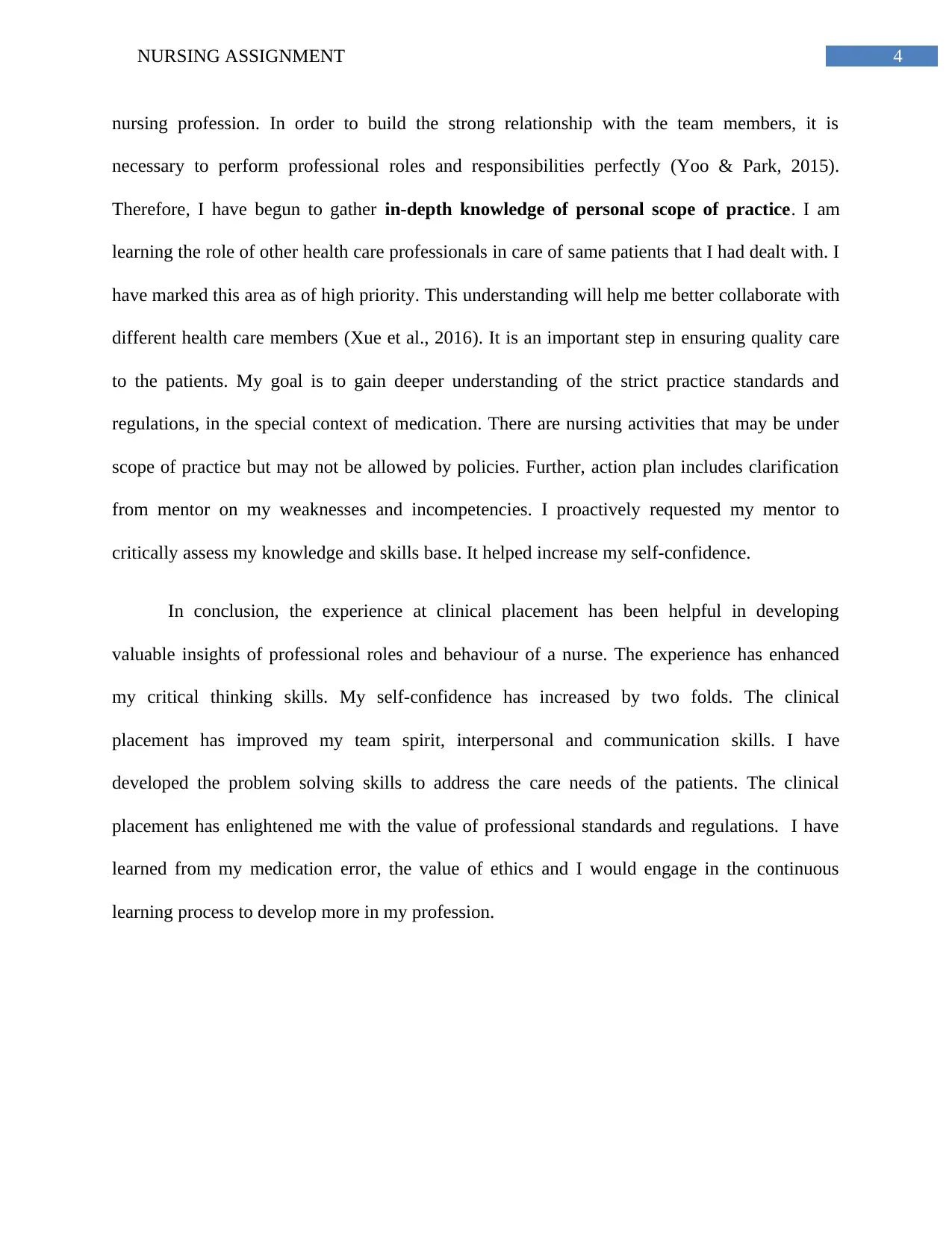
4NURSING ASSIGNMENT
nursing profession. In order to build the strong relationship with the team members, it is
necessary to perform professional roles and responsibilities perfectly (Yoo & Park, 2015).
Therefore, I have begun to gather in-depth knowledge of personal scope of practice. I am
learning the role of other health care professionals in care of same patients that I had dealt with. I
have marked this area as of high priority. This understanding will help me better collaborate with
different health care members (Xue et al., 2016). It is an important step in ensuring quality care
to the patients. My goal is to gain deeper understanding of the strict practice standards and
regulations, in the special context of medication. There are nursing activities that may be under
scope of practice but may not be allowed by policies. Further, action plan includes clarification
from mentor on my weaknesses and incompetencies. I proactively requested my mentor to
critically assess my knowledge and skills base. It helped increase my self-confidence.
In conclusion, the experience at clinical placement has been helpful in developing
valuable insights of professional roles and behaviour of a nurse. The experience has enhanced
my critical thinking skills. My self-confidence has increased by two folds. The clinical
placement has improved my team spirit, interpersonal and communication skills. I have
developed the problem solving skills to address the care needs of the patients. The clinical
placement has enlightened me with the value of professional standards and regulations. I have
learned from my medication error, the value of ethics and I would engage in the continuous
learning process to develop more in my profession.
nursing profession. In order to build the strong relationship with the team members, it is
necessary to perform professional roles and responsibilities perfectly (Yoo & Park, 2015).
Therefore, I have begun to gather in-depth knowledge of personal scope of practice. I am
learning the role of other health care professionals in care of same patients that I had dealt with. I
have marked this area as of high priority. This understanding will help me better collaborate with
different health care members (Xue et al., 2016). It is an important step in ensuring quality care
to the patients. My goal is to gain deeper understanding of the strict practice standards and
regulations, in the special context of medication. There are nursing activities that may be under
scope of practice but may not be allowed by policies. Further, action plan includes clarification
from mentor on my weaknesses and incompetencies. I proactively requested my mentor to
critically assess my knowledge and skills base. It helped increase my self-confidence.
In conclusion, the experience at clinical placement has been helpful in developing
valuable insights of professional roles and behaviour of a nurse. The experience has enhanced
my critical thinking skills. My self-confidence has increased by two folds. The clinical
placement has improved my team spirit, interpersonal and communication skills. I have
developed the problem solving skills to address the care needs of the patients. The clinical
placement has enlightened me with the value of professional standards and regulations. I have
learned from my medication error, the value of ethics and I would engage in the continuous
learning process to develop more in my profession.
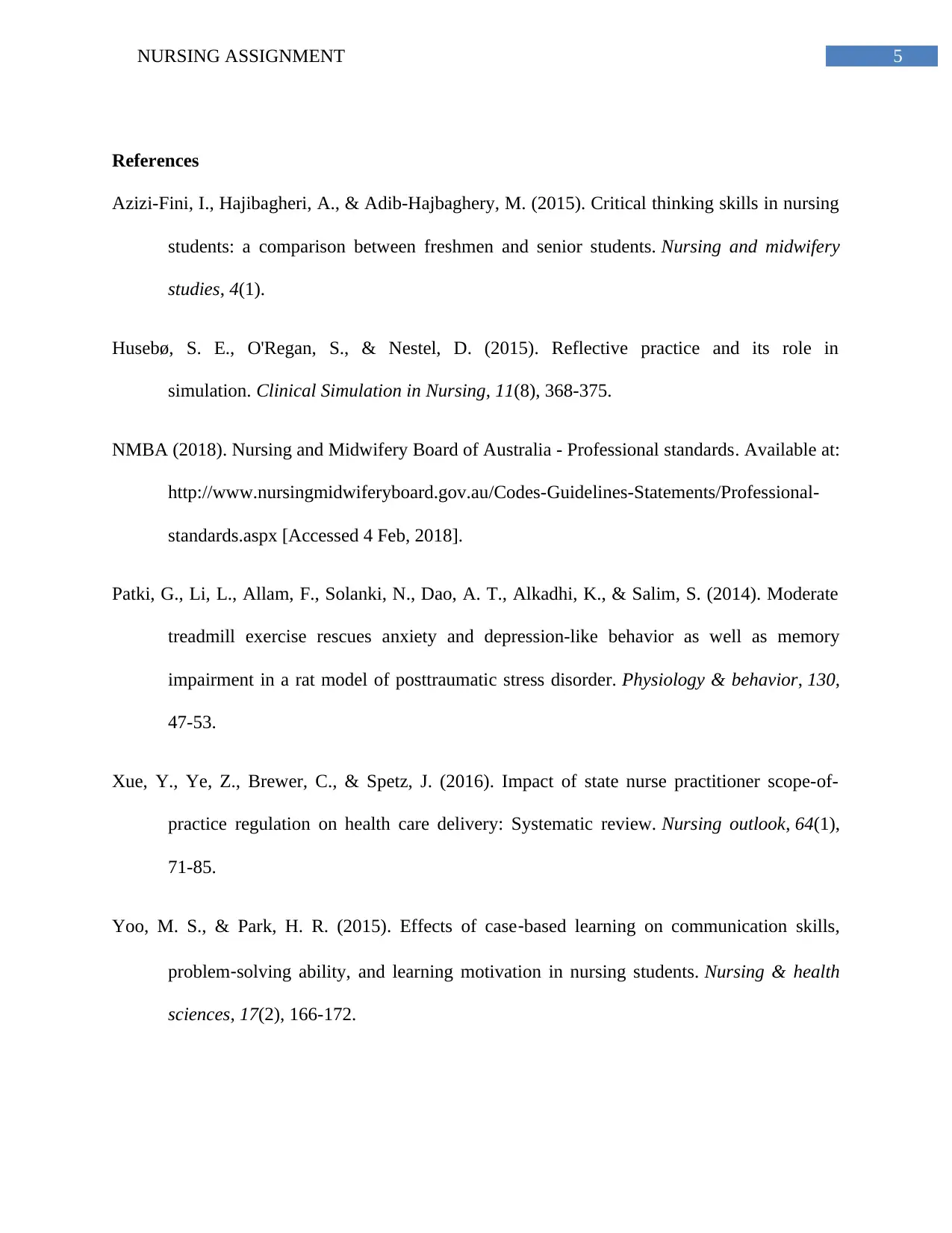
5NURSING ASSIGNMENT
References
Azizi-Fini, I., Hajibagheri, A., & Adib-Hajbaghery, M. (2015). Critical thinking skills in nursing
students: a comparison between freshmen and senior students. Nursing and midwifery
studies, 4(1).
Husebø, S. E., O'Regan, S., & Nestel, D. (2015). Reflective practice and its role in
simulation. Clinical Simulation in Nursing, 11(8), 368-375.
NMBA (2018). Nursing and Midwifery Board of Australia - Professional standards. Available at:
http://www.nursingmidwiferyboard.gov.au/Codes-Guidelines-Statements/Professional-
standards.aspx [Accessed 4 Feb, 2018].
Patki, G., Li, L., Allam, F., Solanki, N., Dao, A. T., Alkadhi, K., & Salim, S. (2014). Moderate
treadmill exercise rescues anxiety and depression-like behavior as well as memory
impairment in a rat model of posttraumatic stress disorder. Physiology & behavior, 130,
47-53.
Xue, Y., Ye, Z., Brewer, C., & Spetz, J. (2016). Impact of state nurse practitioner scope-of-
practice regulation on health care delivery: Systematic review. Nursing outlook, 64(1),
71-85.
Yoo, M. S., & Park, H. R. (2015). Effects of case‐based learning on communication skills,
problem‐solving ability, and learning motivation in nursing students. Nursing & health
sciences, 17(2), 166-172.
References
Azizi-Fini, I., Hajibagheri, A., & Adib-Hajbaghery, M. (2015). Critical thinking skills in nursing
students: a comparison between freshmen and senior students. Nursing and midwifery
studies, 4(1).
Husebø, S. E., O'Regan, S., & Nestel, D. (2015). Reflective practice and its role in
simulation. Clinical Simulation in Nursing, 11(8), 368-375.
NMBA (2018). Nursing and Midwifery Board of Australia - Professional standards. Available at:
http://www.nursingmidwiferyboard.gov.au/Codes-Guidelines-Statements/Professional-
standards.aspx [Accessed 4 Feb, 2018].
Patki, G., Li, L., Allam, F., Solanki, N., Dao, A. T., Alkadhi, K., & Salim, S. (2014). Moderate
treadmill exercise rescues anxiety and depression-like behavior as well as memory
impairment in a rat model of posttraumatic stress disorder. Physiology & behavior, 130,
47-53.
Xue, Y., Ye, Z., Brewer, C., & Spetz, J. (2016). Impact of state nurse practitioner scope-of-
practice regulation on health care delivery: Systematic review. Nursing outlook, 64(1),
71-85.
Yoo, M. S., & Park, H. R. (2015). Effects of case‐based learning on communication skills,
problem‐solving ability, and learning motivation in nursing students. Nursing & health
sciences, 17(2), 166-172.
⊘ This is a preview!⊘
Do you want full access?
Subscribe today to unlock all pages.

Trusted by 1+ million students worldwide
1 out of 6
Related Documents
Your All-in-One AI-Powered Toolkit for Academic Success.
+13062052269
info@desklib.com
Available 24*7 on WhatsApp / Email
![[object Object]](/_next/static/media/star-bottom.7253800d.svg)
Unlock your academic potential
Copyright © 2020–2026 A2Z Services. All Rights Reserved. Developed and managed by ZUCOL.





